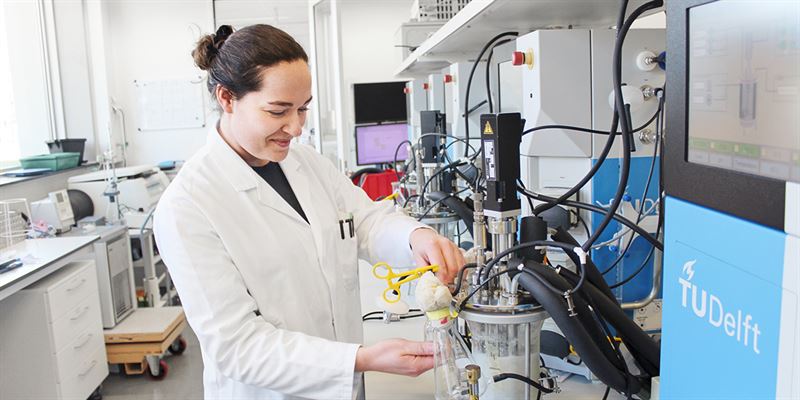An automated bioreactor solution tailored for the next generation of science
Getinge has supported scientists at the Delft University of Technology in the Netherlands in their research driven by the fight against climate change. By developing an automated bioreactor setup, which is tailored to improve studies of genetically engineered cells in the pursuit of replacing petrochemicals with plant-based materials – the partners are bringing science to life.

“The cells are extremely complex and it’s impossible to always fully understand what happens inside them. Some behave as intended, others become sick and grow slowly. We optimize this by using evolution to allow cells to evolve and become healthier and faster,” explains Dr. Ir. Robert Mans, Assistant Professor at the Department of Biotechnology.
Since the research team used to be relatively limited in terms of automating evolutions, the medium in the bioreactor often had to be changed by hand – always with a risk of contamination and potential setbacks.
He continues: “With a more automated solution, we wouldn’t have to open the bioreactor during the monthlong processes. From a theoretical point of view, we knew exactly what we wanted, but we needed someone to actually realize our vision, creating and implementing a solution with all the flexibility we require.”
Getinge’s team developing Applikon bioreactors, also located in Delft, took on the challenge to create a customized solution, which automatically controls two types of long-duration bioreactor processes that normally require a lot of manual interventions.
“The main challenge was to combine data from the university’s own offgas analyzer devices with all the process data from the Applikon control system. The next step was to use this online data to automatically control processes in the desired way,” says Rowin Timmermans, senior Application Specialist at Getinge in Delft.
Rowin continues: “I visited the university several times to run tests together. This way of working together, with frequent and constructive feedback, is the key to success. It helped us fully understand the requirements and come up with a solution that is tailored to the customer’s exact needs.”
Dr. Mans is also happy with the progress – and the result.
“In a relatively short time, based on a period of trial and error, we managed to get to an end result that does everything that we wanted from the system,” he says.
Dr. Mans’ PhD student, Sophie de Valk adds:
“You can view many things that going on in the bioreactor online. So, you don’t have to stare at it all the time to know that everything is going smoothly. Now, this is just a few clicks away on your computer. It feels really good to engage in the search for alternatives to the fossil-based industry that enable us to become more plant-based. There is cutting-edge innovation going on at the moment, and it’s really cool to be a part of that.”
In the end, both the Delft research team and Getinge engineers were so pleased with the result that they hosted a joint webinar to share their learnings from the process and the possibilities of the cutting-edge automated bioreactor system.
Read the entire case study of the cooperation between Delft University of Technology and Getinge >>>